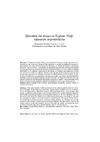Identificador persistente para citar o vincular este elemento:
https://accedacris.ulpgc.es/handle/10553/57809
| Campo DC | Valor | idioma |
|---|---|---|
| dc.contributor.author | Sánchez Cuervo, Margarita Esther | en_US |
| dc.date.accessioned | 2019-11-10T12:35:22Z | - |
| dc.date.available | 2019-11-10T12:35:22Z | - |
| dc.date.issued | 2007 | en_US |
| dc.identifier.issn | 0211-2140 | en_US |
| dc.identifier.other | Dialnet | |
| dc.identifier.uri | https://accedacris.ulpgc.es/handle/10553/57809 | - |
| dc.description.abstract | El siguiente artículo ofrece una recopilación de los principales argumentos encontrados en los ensayos de Virginia Woolf, siguiendo un modelo de análisis de argumentación retórica, tal y como lo introdujeron Ch. Perelman y L. Olbrechts-Tyteca en su concepción de la «nueva retórica». Los ensayos de esta autora han sido casi siempre considerados de la perspectiva de la historia literaria y la crítica feminista, y se echa en falta un análisis sistemático de los aspectos lingüísticos de los textos. La Retórica, concebida como ciencia que permite el estudio de cualquier discurso oral y escrito, puede reflejar en nuestro caso los principios que gobiernan el corpus de ensayos de Woolf, definiendo de esta forma los elementos textuales y extratextuales que constituyen su estilo y transmiten una ideología. Esta ideología no sólo denuncia la situación social de la mujer a lo largo de la historia, sino que también rescata la obra literaria de personajes conocidos en mayor o menor medida, con la idea de acercarnos a una tradición cultural más amplia y rica de la que cabría esperar. | en_US |
| dc.description.abstract | This study intends to offer an account of the main arguments found in the essays of Virginia Woolf, following a rhetorical argumentation analysis model as introduced by Ch. Perelman and L. Olbrechts-Tyteca in their conception of the «new rhetoric». Her essays, considered nearly always from a literary history and feminist criticism approach, have lacked a systematic analysis of the linguistic aspects of the text. Rhetorics, seen as the science that allows the study of any written and oral discourse, can depict in this case the principles that govern the essay corpora of Virginia Woolf, defining the textual and extra textual elements that portray her style and further ideology. An ideology that not only denounces the woman’s social situation throughout History, but also tries to recover the literary work of known and unknown writers, both male and female, in an attempt to get us closer to a wider and richer cultural tradition than we should expect. | en_US |
| dc.language | spa | en_US |
| dc.relation.ispartof | Boletín Millares Carlo | en_US |
| dc.source | Boletín Millares Carlo [ISSN 0211-2140], n. 26, p. 261-278 | en_US |
| dc.subject | 6202 Teoría, análisis y crítica literarias | en_US |
| dc.subject.other | Virginia Woolf (1882-1941) | en_US |
| dc.subject.other | Retórica | en_US |
| dc.subject.other | Argumentación | en_US |
| dc.subject.other | Argumento | en_US |
| dc.subject.other | Discurso | en_US |
| dc.subject.other | Ensayo | en_US |
| dc.subject.other | Feminismo | en_US |
| dc.subject.other | Rhetorics | en_US |
| dc.subject.other | Argument | en_US |
| dc.subject.other | Discourse | en_US |
| dc.subject.other | Essay | en_US |
| dc.title | Elementos del Ensayo en Virginia Wolf: Valoración argumentativa | en_US |
| dc.type | info:eu-repo/semantics/article | en_US |
| dc.type | Article | en_US |
| dc.identifier.url | http://dialnet.unirioja.es/servlet/articulo?codigo=2592829 | - |
| dc.description.lastpage | 278 | - |
| dc.identifier.issue | 26 | - |
| dc.description.firstpage | 261 | - |
| dc.investigacion | Artes y Humanidades | en_US |
| dc.type2 | Artículo | en_US |
| dc.contributor.authordialnetid | 1000472 | - |
| dc.identifier.dialnet | 2592829ARTREV | - |
| dc.identifier.ulpgc | Sí | es |
| item.fulltext | Con texto completo | - |
| item.grantfulltext | open | - |
| crisitem.author.dept | GIR Discourse, Communication and Society | - |
| crisitem.author.dept | Departamento de Filología Moderna, Traducción e Interpretación | - |
| crisitem.author.orcid | 0000-0002-5562-8837 | - |
| crisitem.author.parentorg | Departamento de Filología Moderna, Traducción e Interpretación | - |
| crisitem.author.fullName | Sánchez Cuervo, Margarita Esther | - |
| Colección: | Artículos | |
Visitas
574
actualizado el 07-sep-2024
Descargas
378
actualizado el 07-sep-2024
Google ScholarTM
Verifica
Comparte
Exporta metadatos
Los elementos en ULPGC accedaCRIS están protegidos por derechos de autor con todos los derechos reservados, a menos que se indique lo contrario.
